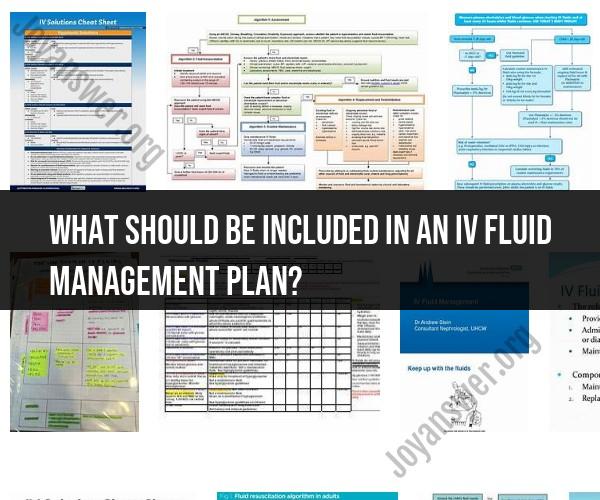What should be included in an IV fluid management plan?
An effective intravenous (IV) fluid management plan is essential for providing appropriate hydration and maintaining electrolyte balance in patients. Such a plan should be tailored to the individual patient's medical condition, needs, and goals of care. Here are the key components that should be included in an IV fluid management plan:
Assessment and Diagnosis:
- Conduct a thorough assessment of the patient's medical history, including underlying medical conditions, fluid and electrolyte imbalances, medications, and allergies.
- Perform a physical examination to assess vital signs, signs of dehydration, and any edema or fluid overload.
- Diagnose the patient's specific fluid and electrolyte needs based on the assessment findings.
Fluid Prescription:
- Determine the type of IV fluid required, such as crystalloids (e.g., normal saline, lactated Ringer's solution) or colloids (e.g., albumin), based on the patient's condition and electrolyte status.
- Specify the rate of IV fluid administration in milliliters per hour (mL/hr) or drops per minute (gtts/min).
- Consider the patient's age, weight, and comorbidities when prescribing fluids.
Electrolyte Replacement:
- If the patient has specific electrolyte imbalances (e.g., hyponatremia, hyperkalemia), include appropriate electrolytes in the IV fluid prescription.
- Determine the quantity and rate of electrolyte supplementation based on laboratory results and clinical assessment.
Fluid Balance Monitoring:
- Establish a schedule for monitoring the patient's fluid balance, which may include daily weights, intake and output measurements, and regular clinical assessments.
- Track changes in vital signs, urine output, and signs of fluid overload or dehydration.
Infection Prevention:
- Implement strict infection control measures during IV line insertion, maintenance, and site care to prevent catheter-related infections.
- Use aseptic techniques, proper hand hygiene, and sterile equipment.
Complication Management:
- Include plans for managing potential complications, such as infiltration, phlebitis, air embolism, or fluid overload.
- Educate healthcare providers on early recognition and appropriate responses to complications.
Patient Education:
- Educate the patient and/or their caregivers about the purpose of IV fluid therapy, expected outcomes, and signs of complications.
- Provide information on the importance of compliance with fluid therapy and medication regimens.
Documentation:
- Maintain accurate and comprehensive records of IV fluid administration, including the type and volume of fluids administered, any additives, and patient responses.
- Document vital signs, intake and output, laboratory results, and clinical assessments.
Regular Review and Adjustment:
- Periodically review and reassess the patient's fluid and electrolyte status.
- Adjust the IV fluid management plan as needed based on changes in the patient's clinical condition or laboratory values.
Communication:
- Ensure effective communication among healthcare team members regarding the IV fluid management plan, changes in the patient's condition, and any adjustments made to the plan.
Evidence-Based Practice:
- Base the IV fluid management plan on current evidence-based guidelines and best practices in fluid and electrolyte management.
Transitions of Care:
- Plan for the continuity of care, including the transition from the acute care setting to outpatient or home care if applicable.
Ethical and Legal Considerations:
- Address any ethical or legal considerations related to IV fluid management, including informed consent, withholding or withdrawing fluids, and end-of-life care decisions.
It's important to emphasize that IV fluid management should be individualized to each patient's specific clinical condition, and healthcare providers should consider factors such as age, comorbidities, and goals of care when creating and implementing the plan. Frequent reassessment and collaboration among healthcare team members are key to ensuring optimal IV fluid therapy.













